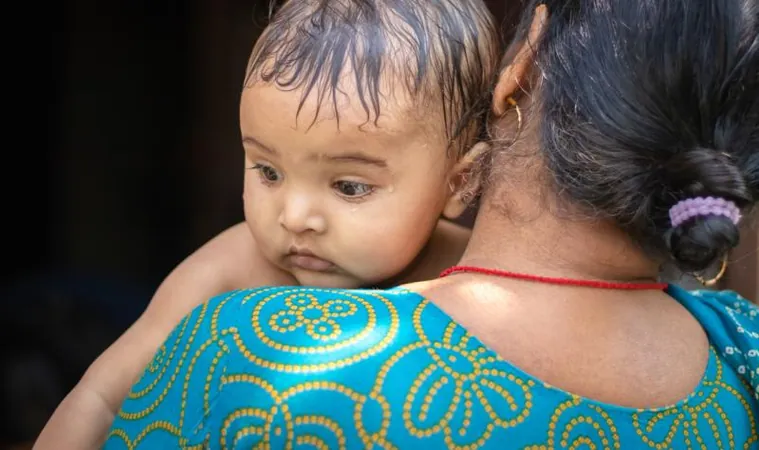
Alarming Study Reveals High Levels of Resistant Bacteria in Infants from Low-Income Countries
2024-11-05
Author: John Tan
Introduction
A groundbreaking systematic review and meta-analysis published today in JAMA Network Open has unveiled a shocking discovery: a significant number of infants under three months in low-resource countries are colonized with antimicrobial-resistant bacteria. This finding raises urgent concerns about the health of newborns in regions where medical resources are already stretched thin.
Bacterial Pathogens of Concern
The research identifies Escherichia coli, Klebsiella pneumoniae, and Staphylococcus aureus as the leading bacterial culprits behind infections in these vulnerable infants. Notably, these pathogens are the primary drivers of mortality linked to antimicrobial resistance (AMR) in newborns in low- and middle-income countries (LMICs).
Challenges in Data Collection
Despite the alarming nature of this research, data concerning resistant infections in these regions remains scarce. Limited access to healthcare and diagnostic microbiological testing, alongside difficulties in collecting samples from newborns, often hinders tracking infections. To bridge this knowledge gap, a team of French researchers turned their focus towards bacterial colonization, as this aspect is less reliant on healthcare access and can provide crucial insights into AMR transmission.
Methodology of the Study
The team conducted a comprehensive review of literature from 2000 to July 2024, assessing studies related to the prevalence and risk factors for third-generation cephalosporin-resistant Enterobacterales (3GCRE), carbapenem-resistant Enterobacterales (CRE), and methicillin-resistant Staphylococcus aureus (MRSA) colonization in infants. This extensive meta-analysis incorporated data from 67 studies, encompassing over 17,000 infants.
Key Findings
The findings are startling: the pooled prevalence of 3GCRE colonization was found to be a staggering 30.2%. This prevalence varies significantly, rising to 48.2% among hospitalized infants compared to 18.2% in non-hospitalized infants. Moreover, the study recorded a CRE colonization rate of 2.6% and MRSA at 2.7%.
Risk Factors
Risk analysis from 19 studies showed that several factors significantly elevate the risk of 3GCRE colonization in infants. Notably, being born in a hospital increased the odds by nearly two-fold, while neonatal antibiotic use and prolonged rupture of membranes posed even greater risks, with odds ratios indicating nearly three to four times increased chances, respectively.
Implications for Healthcare
The implications of these findings are profound. Healthcare environments and the administration of antibiotics in neonates are highlighted as critical areas needing attention. The authors advocate for enhanced infection control measures and responsible use of antibiotics in maternity and neonatal health setups across LMICs.
The Neonatal Microbiome
Additionally, the research points to the unique nature of the neonatal microbiome, which is described metaphorically as an "empty biological niche." The low microbial diversity in newborns creates an environment where even short exposures to resistant bacteria can lead to colonization, amplifying the risk of developing antibiotic-resistant infections rapidly.
Caution and Future Research
The authors urge caution in interpreting the results due to the observed high variability among studies. However, these revelations lay the groundwork for future research aimed at developing interventions to curb neonatal colonization by resistant bacteria.
Conclusion
As we move forward, this study serves as a stark reminder of the pressing need to address AMR, particularly in vulnerable populations such as infants in low-income settings. The health of our youngest and most defenseless must not be left to chance; without strategic interventions, we may witness a growing public health crisis with far-reaching consequences.



 Brasil (PT)
Brasil (PT)
 Canada (EN)
Canada (EN)
 Chile (ES)
Chile (ES)
 España (ES)
España (ES)
 France (FR)
France (FR)
 Hong Kong (EN)
Hong Kong (EN)
 Italia (IT)
Italia (IT)
 日本 (JA)
日本 (JA)
 Magyarország (HU)
Magyarország (HU)
 Norge (NO)
Norge (NO)
 Polska (PL)
Polska (PL)
 Schweiz (DE)
Schweiz (DE)
 Singapore (EN)
Singapore (EN)
 Sverige (SV)
Sverige (SV)
 Suomi (FI)
Suomi (FI)
 Türkiye (TR)
Türkiye (TR)